9 Causes of a Steering Wheel That Makes Noise When Turning
Steering should operate noise-free. But worn parts can cause concerning whines, groans or rubbing when turning. Don’t ignore these red flags.
Learn what suspension and steering components are engaged and stressed when turning, where issues may lurk, and how to inspect the system. Finding the cause of a steering wheel that makes noise when turning early on will save money and prevent safety hazards.
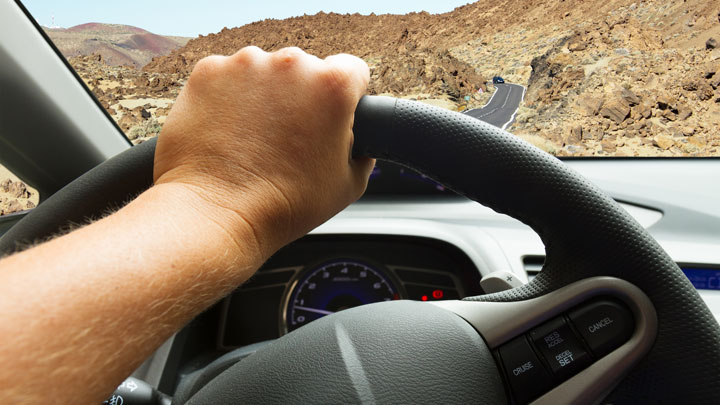
See Also: 9 Causes of Rattling Noise While Accelerating
Common Causes of a Noisy Steering Wheel When Turning
When there’s a problem with a component in the suspension or steering system, they’ll have trouble supporting the vehicle’s heavy weight. They must also be able to move in the ways they’re supposed to.
Although lubrication will help preserve their lifespan, these parts will fail eventually. The first warning sign will be noises when turning the steering wheel. Here’s what they could mean:
#1 – Jounce Bushing is Dry
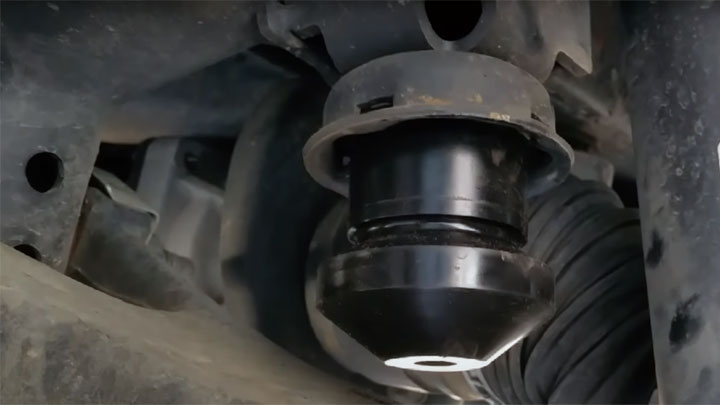
The front strut has something called a jounce bushing on top of it. When the bushing becomes dry, turning will create creaking or groaning sounds. These sounds will get worse the longer you wait to fix this problem.
See Also: 5 Ways to Clean a Steering Wheel (Depending on Material)
#2 – Bad Power Steering Rack
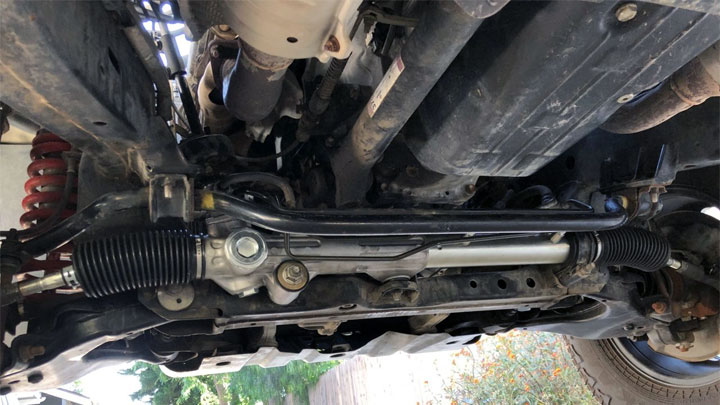
A whining sound while turning could be the result of a bad power steering rack. This whining sound will be most recognizable while driving at lower speeds. Sometimes a bad belt or vane pump can cause this too.
#3 – Bad Struts and Shocks
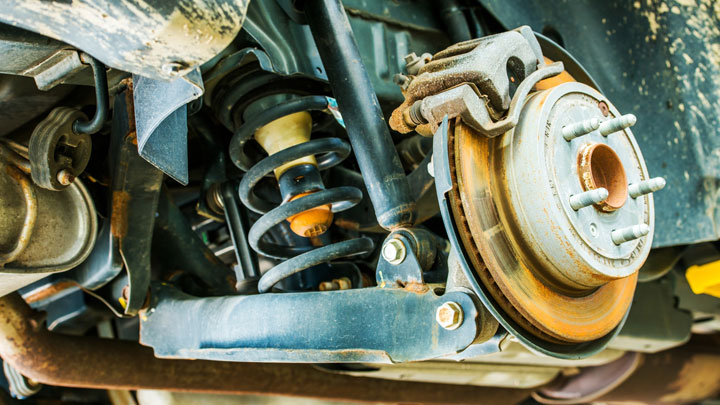
Your struts and shocks can last quite a long time in your vehicle, but eventually they will wear down and go bad. The first sign is noises when you turn. If the parts are not replaced, the car will also begin to bounce during turns.
#4 – Worn Steering Column Bearing
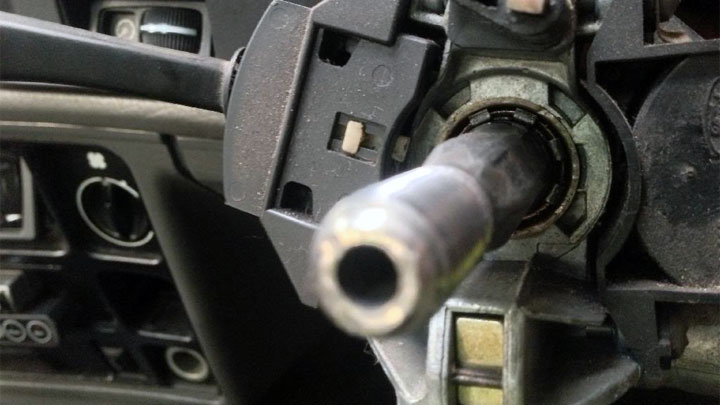
If your steering wheel is making a loud rubbing noise when turning, the culprit could be the upper bearing on the steering column itself.
This can cause the the plastic on the back of some steering wheels to rub against the cowling on the steering column. This is most noticeable in hot weather which causes some parts to expand.
See Also: 5 Signs of a Faulty Clock Spring
#5 – Bad Tie Rod Ends
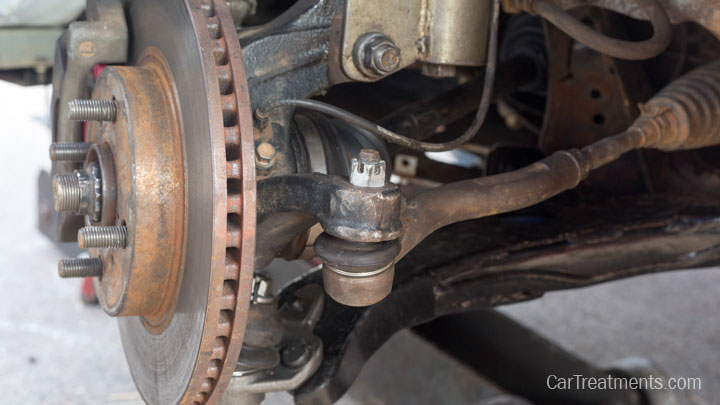
When you turn a steering wheel, it’s the tie rods which enable the wheels to move in response. A loose or damaged tie rod will create a knocking, clunking, or creaking sound. This is especially true when you turn at lower speeds.
A bad tie rod end may even cause your steering wheel to become off-center or simply feel loose like it has too much play.
#6 – Bad Ball Joints
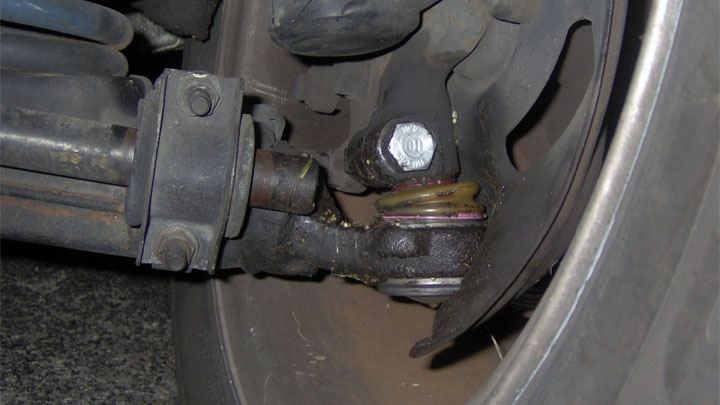
The steering knuckles and control arms are able to sustain movement with the help of ball joints. These joints need lubrication to prevent themselves from going dry.
When they become dry, they will start to make noise. Worn ball joints are also often the issue if your steering wheel shakes.
#7 – Bad Control Arm Bushings
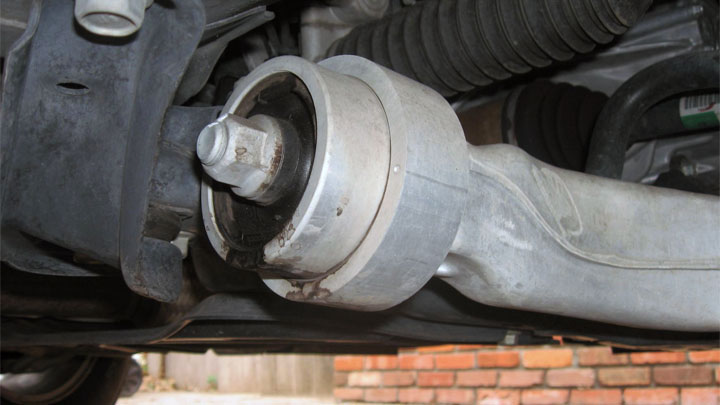
Like all bushings, the control arm bushings will wear over time and eventually will go bad. All the wear and tear causes them to break down and crack. This will result in a creaking sound as you turn the wheel.
#8 – Power Steering Fluid Leaks
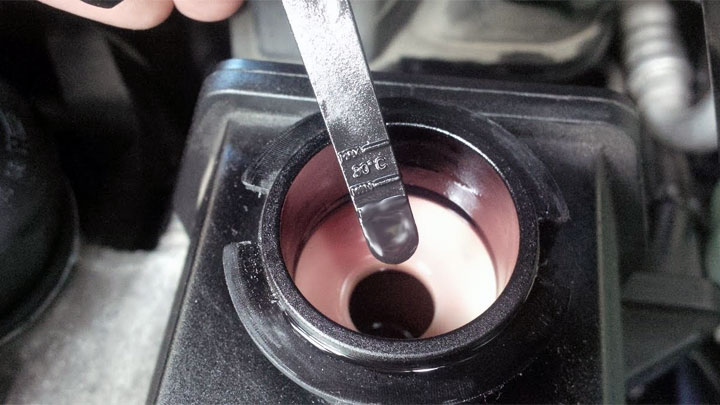
Power steering systems use a specially formulated fluid to lubricate and transmit the necessary pressure to move the steering smoothly. This fluid flows from a reservoir to the steering rack and pinion or steering box.
If the power steering fluid leaks, it will produce a noise, especially when turning. A low level of power steering fluid usually indicates a leak.
#9 – Clogged Power Steering Fluid Reservoir

Power steering fluid is stored in the steering reservoir tank. Generally, there is filter inside reservoir tank to keep the fluid clean. When the reservoir becomes clogged, it will also produce a noise when turning.
How to Fix
The problem can be diagnosed in virtually any location. A professional mechanic is able to easily check your suspension system and steering system to see what’s causing the noises. Based on their diagnosis, they will recommend what needs to be fixed or replaced.
Sometimes your suspension system might just require lubrication, but while they’re in there, other worn or damaged parts will be noted as needing to be repaired or replaced.
- Replace the Engine or Replace the Car? (11 Factors to Consider) - Apr 11, 2024
- Plastic Piece Dragging Under Your Car? (What It Is and What To Do) - Mar 21, 2024
- Timing Belt vs Timing Chain (What’s the Difference?) - Feb 27, 2024

thanks, now if am to visit the garage I have where to start from concerning the steering box
I have the same problem with my car’s steering wheel making noise when turning. It’s really annoying!
Can you tell if the noise is coming from the steering column inside the cabin, something under the hood, or something under the car? What does the noise sound like? Does it click, groan, or something else?
I own mk7.5 Gti 2018 with 25000 km..these days when I turn steering wheel there’s a knock or crack sound especially fromm the right side and sometimes under my feet . What’s the problem?
Is this something with steering box?
Someone will likely see the problem by putting your car up on a lift. Check the tie rods, sway bar end links, struts, wheel bearings, and steering rack.
I need advice. A used SUV I haven’t owned even three weeks now, but only have driven a two hour trip and then an 8 hour trip to and from my destination. It’s done fantastic so far, until I was coming home today. The weather changed drastically and the temperature dropped. When I go to pull out from parking, turning the wheel slowing as you do when pulling out… It has started making a mild whining noise. It only does it when doing this, but not while actually driving it. It’s not loud and the steering isn’t being affected. What does mean? Can someone please give me some advice? I would very much appreciate it.
Would you describe this as a “groaning” sound? If so, it sounds like the power steering system is working extra hard for some reason. It’s common for vehicles to do this when you hold the steering wheel at full lock, and it’s not good for a hydraulic power steering system to hold the wheel there for more than a few seconds.
If you have a truck-based SUV, also check to make sure you’re not driving around with 4×4 turned on. It’s very bad to do this on pavement, as this feature is only intended for off road use where the tires are able to slip freely on dirt, snow, and gravel surfaces.
Please help me my rx330 jeep, whenever I try to turn it if I am not accelerating, it’s hard, and if am moving on low speed, and decides to make a full wheel turn, to left or light, u will be hearing noise like something is holding it, a sounds like ko ko ko, bd will b braking the movement, my mechanic has changed tie rods, and ball joints, yet, what do I do
Has the mechanic checked your power steering system? It sounds like perhaps something is wrong with your power steering.
Insightful, helpful, invaluable. I now know problem with my car has to be one of #2!!
Well has this noise over 15 or so years ago.moving slow or not moving just rocking steering wheel left to right hear a Zipper like noise. Some call it a swoosh. Not very loud. No loose and no clunk. Sorta have to rock wheel back and forth fast to hear it. Steering always perfect other than that back after all these years. No noise outside no noise under hood no noise under car. GM fixed it last time. I sorta remember what they replaced instead of fix because I still has GM warranty at the time. It’s a 2000 pontiac grand am gt sedan 3.4L
My steering wheel couldn’t turn properly anymore, the power steering was broken. I went to a mechanic and they charged a lot to change the ‘power steering pressure hose’.
Now it turns easily, but it makes a weird scary noise whenever i am turning the wheel more than 45 degrees, especially at low speed…
Can you describe the scary noise? Does it sound sort of like a groaning?
When I turn the steering wheel, there’s loud noises coming from the front. I’m having it towed. The mechanic said it could be anything. Hope it’s not an expensive repair. Thanks for your information.
Good luck, I hope it’s a simple fix.
Did u find out what it was and how much it costed I’m currently in same situation
I took my car to a tire shop to see what it needed and surprisingly he said I only needed an alignment about a month later I got 4 brad new tires but the wheel whines when I turn and there’s power steering fluid in it but wheels tight too but yesterday I noticed the power steering level has not changed at all it’s almost like there’s something in the system preventing it to reach the places that need to be lubricated I’m so worried that it’s going to be something real bad that I can’t afford can anyone give me some pointers and opinions please? Thanks
Consider having the power steering system inspected if you are concerned. Sounds like the whining is the pump struggling. Perhaps there is air in the system or maybe the pump is on its way out. A mechanic should be able to help you narrow that down.
Very Informative article, thank you.
My vehicle is a prado tx land cruiser.I just fited a new steering rack last month.
But the noise as not stopped and at times the steering is stif
Not sure what the noise could be in your case. It would be best to take your vehicle to a mechanic to get it checked out.
Hi guys! I would very much appreciate if i can get an answer since my mechanic cant seem to find the problem. I have a mercedes 2015 c class diesel.
When i turn the steering wheel right or left i can FEEL a click from the steering wheel. Its a 1 second click (or less) no grinding or squeeking. My mechanic changed both arm bushings. But the problem is still there. Its very annoying.
I also can confirm its nothing to do with the tires as i just changed them as well.
It sounds like you’ll need to find a mechanic who can give you a more thorough diagnosis, at least for this issue. All people on the internet can really do is throw out suggestions, but you’ll need someone to feel it and do some testing in person to narrow down the scope of the problem.
Perhaps you need a new steering rack and pinion, tie rod ends, or something may be binding in the clock spring. Simply throwing parts at the problem will get expensive really quick, though.
Hi 👋
I got the exact same problem with my Vw golf Gti 2018 .when I turn my wheel to the right I hear the sane sound .
I just saw your comment , did you find your answer ?
Article informative and straight to the point.
Thanks, now when I take the car in to the mechanic I will have a clue as to what they are talking about.
Very helpful. Concise. Thank you.
Thank You
Nice Article